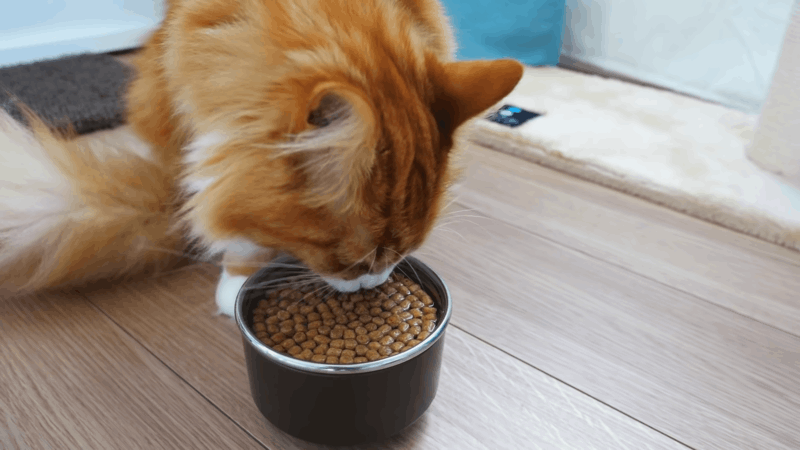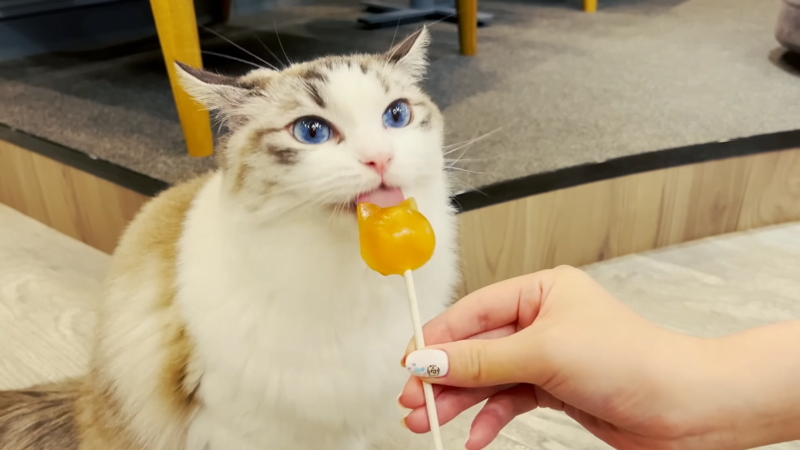No products in the cart.
CBD gummies for dementia in cats have generated interest as a potential avenue for management. While CBD has demonstrated promise in addressing various symptoms in both humans and animals, its specific effects on dementia in cats remain a subject of ongoing research. This has sparked curiosity about the potential benefits of CBD gummies specifically tailored for cats with dementia. In this article, we will discover what are CBD gummies for dementia in cats, normal gummies for dementia in cats, CBD for dementia aggression in cats, and factors to consider when choosing the right edibles for dementia in cats.
What Are CBD Gummies for Dementia in Cats?
The use of CBD gummies for dementia in cats is an area where research is limited. While CBD has shown potential therapeutic effects in managing symptoms related to various conditions, including anxiety and pain, its specific effects on dementia in cats are not well-studied. Therefore, it is important to consult with a veterinarian before considering CBD gummies for dementia in cats or any other CBD product for dementia management in cats.

CBD Gummies Effects for Dementia in Cats
The effects of CBD gummies on dementia in cats are still being studied, and research in this area is limited. While CBD has shown potential therapeutic effects in managing symptoms associated with various conditions, its specific effects on dementia in cats are not well-established. Some anecdotal reports suggest that CBD may help with symptoms such as anxiety, restlessness, and cognitive decline in cats with dementia.
How CBD Gummies Interacts With Dementia in Cats
CBD gummies for dementia in cats interact with the endocannabinoid system (ECS) in cats similarly to how they do in humans. The ECS is a complex network of receptors, enzymes, and endocannabinoids that help regulate various bodily functions. CBD can interact with cannabinoid receptors, such as CB1 and CB2 receptors, within the ECS. By interacting with these receptors, CBD may modulate the signaling within the ECS, potentially affecting processes related to dementia in cats. However, the specific mechanisms of CBD’s interaction with the ECS in the context of feline dementia require further investigation.
Advantages of CBD Gummies for Dementia Management in Cats
CBD gummies for dementia in cats can offer several advantages for dementia management compared to other forms of CBD administration. Firstly, they are convenient and easy to administer, making it simpler to provide a consistent dosage to the cat. The gummies also provide a discreet and palatable option, which can be beneficial for cats with dementia who may have difficulty taking medications. Additionally, CBD gummies typically have precise dosing information, allowing for better control over the amount of CBD given to the cat.
Factors to Consider When Choosing CBD Gummies for Cats With Dementia
When choosing CBD gummies for cats with dementia, there are several factors to consider. To make sure CBD is suitable for your cat and to find the right dosage, speak with a veterinarian with experience in feline care first. Look for CBD gummies for dementia specifically formulated for cats, as they should have appropriate dosing instructions and be free from any ingredients that may be harmful to felines.
It is important to select high-quality CBD gummies for dementia in cats from reputable manufacturers, ensuring that they are free from contaminants and third-party tested for purity and potency. Additionally, consider your cat’s individual preferences and any potential dietary restrictions or sensitivities.
Normal Gummies for Dementia in Cats
The use of gummies specifically for dementia in cats has not been extensively studied. While CBD gummies may be a popular form of CBD administration for humans, their use and effectiveness for dementia in cats are not well documented. It is crucial to consult with a veterinarian before considering any specific type of gummy or CBD product for managing dementia in cats.

The Importance of Selecting Legitimate Gummies Brands
When it comes to selecting gummies or any other form of medication for the treatment of dementia in cats, it is crucial to prioritize legitimate brands and products. Here’s why:
- Safety and Quality Control: Legitimate brands adhere to strict safety standards and maintain quality control measures throughout the production process. This ensures that the gummies are free from harmful substances and contaminants that could potentially harm your cat. Choosing reputable brands minimizes the risk of adverse reactions or side effects.
- Accurate Dosage: Legitimate brands provide accurate dosage information on their products, helping you administer the appropriate amount to your cat. Consistency in dosing is essential for managing dementia symptoms effectively. Trusted brands ensure that their gummies contain the right concentration of active ingredients, maintaining the desired therapeutic effect.
- Efficacy: Legitimate brands invest in research and development to create formulations that are specifically designed for managing dementia in cats. These products are more likely to contain ingredients that have been scientifically studied and proven to be effective in alleviating dementia symptoms. By choosing reputable brands, you increase the likelihood of seeing positive results in your cat’s condition.
- Transparency and Information: Legitimate brands provide comprehensive information about their products, including the ingredients used, sourcing methods, manufacturing processes, and any third-party testing or certifications. This transparency allows you to make informed decisions about the suitability of the gummies for your cat’s needs.
Factors to Consider When Choosing Gummies for Dementia in Cats
When selecting gummies or any other form of treatment for dementia in cats, there are several important factors to consider:
- Ingredients: Carefully review the list of ingredients in the gummies. Buy products that contain ingredients known to be beneficial for cognitive health, such as antioxidants, omega-3 fatty acids, or specific vitamins and minerals. Avoid products that contain unnecessary fillers, artificial additives, or potential allergens that could harm your cat.
- Formulation and Dosage: Consider the formulation and dosage of the gummies. Cats have specific dietary requirements and may require different dosages compared to humans or other animals. Look for gummies specifically formulated for cats, ensuring they are designed to meet their nutritional needs and provide the appropriate dosage for their size and condition.
- Safety and Quality: Choose gummies from reputable brands that prioritize safety and quality. Look for products that are manufactured in facilities that follow good manufacturing practices (GMP) and undergo rigorous quality control measures. Third-party testing and certifications can also provide additional assurance of product safety and quality.
- Veterinary Recommendations: Consult with your veterinarian before introducing any gummies or supplements to your cat’s diet. They can provide guidance on suitable products, dosage recommendations, and potential interactions with any other medications your cat may be taking. Veterinarians are best equipped to assess your cat’s individual needs and help you make informed decisions.
Dosage of Gummies for Treating Feline Dementia
Determining the dosage of gummies for treating feline dementia should be done in consultation with a veterinarian. The appropriate dosage can vary based on factors such as the severity of the cat’s condition, its size and weight, and any other medications or health conditions the cat may have.
Veterinarians have the expertise to assess your cat’s specific needs and prescribe the appropriate dosage. They may recommend starting with a lower dosage and gradually increasing it if necessary, based on the cat’s response to treatment.
CBD for Dementia Aggression in Cats
CBD for dementia aggression in cats is an area that lacks comprehensive scientific research. While CBD has shown potential for managing certain behavioral issues in cats, its specific effects on aggression related to dementia are not well studied.

The Causes and Triggers of Aggression in Cats With Dementia
The causes and triggers of aggression in cats with dementia can vary, as the condition affects their cognitive and behavioral patterns. Dementia can lead to confusion, disorientation, and changes in perception, which may contribute to aggressive behavior. Some common causes and triggers of aggression in cats with dementia include:
- Fear and anxiety: Cats with dementia may experience heightened fear and anxiety, leading to defensive or aggressive behaviors.
- Pain or discomfort: Cats with dementia may have underlying medical conditions or pain, which can make them more irritable and prone to aggression.
- Changes in the environment: Alterations in the familiar surroundings of a cat with dementia, such as rearranged furniture or new household members, can cause stress and trigger aggression.
- Disrupted routine: Cats with dementia often rely on routine and familiarity, and any changes to their established schedule can lead to confusion and increased aggression.
- Overstimulation: Excessive noise, sudden movements, or too much physical interaction can overwhelm cats with dementia and provoke aggressive responses.
- Interactions with other pets: Cats with dementia may have difficulty recognizing or remembering other pets in the household, leading to aggression when encountering them.
- Frustration or confusion: Cats with dementia may struggle to navigate their surroundings or complete familiar tasks, resulting in frustration and potential aggression.
Potential Benefits of CBD in Reducing Aggression in Cats
Understanding the causes and triggers of aggression in cats with dementia is crucial for effective management. Aggression in cats with dementia can be multifactorial and may result from confusion, disorientation, fear, pain, or frustration. Identifying potential triggers, such as changes in the environment, interactions with other pets or humans, or specific situations, can help in devising strategies to minimize aggression episodes.
Other Strategies for Managing Aggression in Cats With Dementia
The potential benefits of CBD in reducing dementia aggression in cats have not been extensively studied. However, CBD’s potential anti-anxiety and calming effects may have some impact on managing aggression in cats. CBD may help promote relaxation and reduce stress, which could potentially contribute to mitigating aggression in some cases. Further research is needed to understand the specific effects of CBD on aggression in cats with dementia.
Managing aggression in cats with dementia requires a multifaceted approach. Besides considering CBD, there are several strategies and techniques that can be employed:
Environmental modifications: Creating a calm and predictable environment by maintaining a consistent routine, providing hiding spots, and minimizing noise or visual stimuli can help reduce stress and aggression.
Behavior modification: Implementing positive reinforcement techniques, such as reward-based training, can help redirect and shape desired behaviors. Engaging in interactive play sessions and providing mental stimulation can also help alleviate anxiety and redirect aggressive tendencies.
Veterinary care: Regular veterinary check-ups are crucial to address any underlying medical conditions that may contribute to aggression. Your veterinarian can assess your cat’s overall health and recommend appropriate interventions.
Medications: In some cases, medication prescribed by a veterinarian may be necessary to manage aggression associated with dementia. These medications are typically prescribed after a thorough evaluation of the cat’s health and behavior.
Professional guidance: Consulting with a veterinarian or a veterinary behaviorist who specializes in feline behavior can provide valuable insights and tailored recommendations for managing aggression in cats with dementia.
Factors to Consider When Choosing the Right Edibles for Dementia in Cats
Choosing the right edibles for cats with dementia involves considering factors such as selecting specifically formulated cat edibles, assessing their nutritional composition, considering texture and size for ease of consumption, ensuring palatability, and taking into account any dietary restrictions or allergies.

Other Edibles for Dementia Management
Exploring alternative edibles for dementia management in cats can involve considering different types of treats or snacks that are safe for feline consumption. Look for treats that are specifically formulated for cats and address their unique nutritional needs. While these edibles may not directly target dementia symptoms, they can still provide nourishment and serve as a positive reinforcement tool during training or behavior modification efforts.
Edible CBD Products for Cats With Dementia
When considering alternative edible CBD products for cats with dementia, it is important to focus on products specifically formulated for pets, including cats. Look for reputable brands that provide transparent information about the sourcing and quality of their CBD. Consider options such as CBD-infused treats or soft chews made with feline-friendly ingredients. Make sure the product has an adequate amount of CBD for your cat’s size and weight. You should also speak with a veterinarian to discover the right dosage for your cat’s individual needs.
How Edibles Specifically Made for Dementia in Cats
Edibles specifically designed for dementia in cats may have certain characteristics to cater to the unique needs of cats with this condition. They may be formulated to provide additional nutrients or supplements that support brain health and cognitive function. These edibles might also focus on ingredients that promote relaxation and reduce anxiety, helping to alleviate symptoms commonly associated with dementia in cats.
Conclusion
When it comes to selecting edibles for cats with dementia, it is important to approach the decision with careful consideration. While research on CBD gummies for dementia in cats is limited, exploring alternative edibles formulated for cats and addressing their unique nutritional needs can be a potential avenue to explore. In general, finding the right edibles for dementia management in cats requires a personalized approach and should be done in conjunction with professional guidance. By making informed choices, you can provide your furry companion with the best possible support in managing their dementia symptoms.
I am Nelson Cooper, I pursue my passion for writing and my belief is that cats love humans. I enjoy traveling and have a deep appreciation for the beauty of nature, as well as a soft spot for animals, particularly cats.


